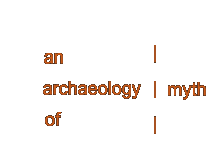
On the Problem of Defining Myth
 |
|
|
Definitions and criticism of myth extend to the 6th century BC Greek thinkers Theagenes and Xenophanes. By the time of Homer and Plato, the myths and mythical thinking were being called into question. "[I]t is especially in Greek culture that myth was submitted to a long and penetrating analysis, from which it emerged radically 'demythicized.'" [Mircea Eliade, "Cosmogonic Myth and 'Sacred History,'" in Alan Dundes (ed.), Sacred Narrative: Readings in the Theory of Myth 137-151, at 138 (Berkeley: University of California Press, 1984)] For a contemporary definition of myth, see Webster's Seventh New Collegiate Dictionary : Myth: a usually traditional story of ostensible historical events that serves to unfold part of the world view of a people or explain a practice, belief, or natural phenomenon; parable, allegory; an ill-founded belief held uncritically especially by an interested group. Mythical: based on or described in a myth, especially as contrasted with factual history: imaginary; fabricated, invented, or imagined in an arbitrary way or in defiance of facts; synonym: fictitious. [On the problems in defining myth, see Lauri Honko, "The Problem of Defining Myth" and G.S. Kirk, "On Defining Myths," in Alan Dundes (ed.), Sacred Narrative: Readings in the Theory of Myth 41-52, 53-61 (Berkeley: University of California Press, 1984)] The most common usage of the idea of myth today is myth as ill-founded
belief, fabrication, an imagined story constructed in defiance of facts,
ficctitious; relates to the idea of myth in opposition to rationality,
and to science, a view that we can trace to the Enlightenment theory of
myth. [See J.W. Rogerson, "Slippery Words: Myth,"
in Alan Dundes (ed.), Sacred Narrative: Readings in the Theory of
Myth 62-71, at 64-65 (Berkeley: University of California Press, 1984)
("Myth is a defective understanding of scientific causes, but because
man finds it necessary to explain phenomena, theories are put forward
in the absence of scientific knowledge.") The Enlightment view of
myth has older roots. Eliade notes that "If in every European language
the word 'myth' denotes a 'fiction,' it is because the Greeks proclaimed
it to be such twenty-five centuries ago." Mircea Eliade, "Cosmogonic
Myth and 'Sacred History'," in Alan Dundes (ed.), Sacred Narrative:
Readings in the Theory of Myth 137-151, at 138 (Berkeley: University
of California Press, 1984)] |